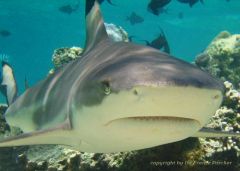During my seven-year study of the behavior of wild blackfin reef sharks (Carcharhinus melanopterus), (described in detail in my book, My Sunset Rendezvous, Crisis in Tahiti), I had many opportunities to observe these sharks in social situations. I expected them to bite in reaction to conflict or disturbance, based on my experiences while working with other animals. Yet they did not. Neither did the other shark species that shared the reef with them: Indo Pacific nurse sharks (Nebrius concolor), white tipped reef sharks(Triaenodon obesus), and the Indo-Pacific lemon shark, (Negaprion acutidens). I concluded that these sharks lacked the bite reflex that is so important for other animals in conflict.
I also never saw sharks fight with each other. In a personal exchange on the subject, shark ethologist Professor Arthur A. Myrberg of the University of Miami wrote:
"During my many observations over about 25 years or so in the field, I've never seen a shark acting aggressively toward another shark other than males pushing or biting females during what appeared as reproductive tactics. I've observed lemons, tigers, bonnetheads, silkies, oceanic white-tips, and blacknoses for reasonably long periods and nurses and blacktips for very short periods of time."
All other species, wild and tame, with whom I'd worked and played, had bitten me sooner or later, either by accident or in a fit of pique. So why had none of those hundreds of sharks of four different species, some many times my size, ever bitten me? I felt sure there must be a reason why Martha, my favourite, would coil through the sea in front of my face, snapping up the treats I was freeing for her while ignoring my hands and the little plastic bag containing the treats.
 One night I accidentally kicked a shark with all my force, not realizing that the six foot animal was between my legs as I finned upward to reach into my kayak. Expecting her to turn and bite, I peered underwater to scrutinize the situation. But there was no change in her speed or trajectory as she curved around to lazily circle me. I was erroneously expecting a reaction from this shark based on my experiences with other animals.
One night I accidentally kicked a shark with all my force, not realizing that the six foot animal was between my legs as I finned upward to reach into my kayak. Expecting her to turn and bite, I peered underwater to scrutinize the situation. But there was no change in her speed or trajectory as she curved around to lazily circle me. I was erroneously expecting a reaction from this shark based on my experiences with other animals.
We humans also share the automatic biting reflex seen so commonly in other animals. Anyone who is attacked will automatically bite in fear and self-defence; it is a powerful instinct for us. But I was wrong to assume that these sharks would display such a reflex too. The available evidence indicated that they lack the bite reflex—they bite to eat, not to injure another animal.
Shark ethologist Dr. Peter Klimley described in his book, The Secret Life of Sharks: A Leading Marine Biologist Reveals the Mysteries of Shark Behavior, how he discovered that the great white shark ritualizes conflict with other great whites when ownership of a seal prey comes into question. Videos of many such displays proved that the shark who splashes water farthest with its tail takes the seal. Thus a physical battle which could gravely harm both sharks, given their dentition, is avoided.
That such an ancient line of animals would have developed a way of ritualizing conflict, presumably to avoid serious injury to others of its species, adds to the evidence that the biting reflex so familiar in most animals should not be assumed to be present in all species of sharks.
I believe that our fear of sharks is very much based on their exaggerated teeth and the assumption that they will bite in aggression or for no discernable reason, like cats and dogs do. But as apex predators, it seems that the sharks I studied use those awesome teeth very purposefully for feeding, not reflexively for self-defence. Sharks are threatened by overfishing and by mistaken attitudes about their danger to humans. I wrote My Sunset Rendezvous in the hope that sharing my experiences with sharks could help correct some of these mistaken assumptions and help preserve these majestic and misunderstood creatures.
Ila France Porcher
www.theplayoflife.org
My Sunset Rendezvous: Crisis in Tahiti